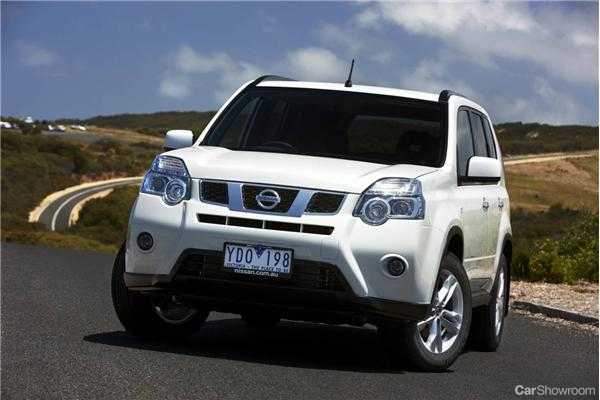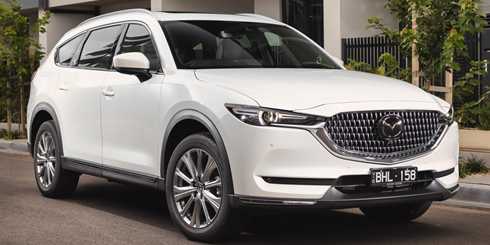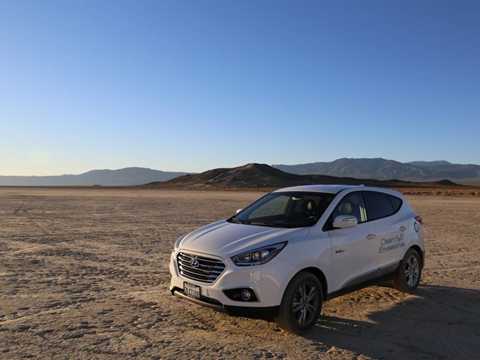Not so long ago Nissan Australia was dominated by passenger cars, but last year the Nissan X-TRAIL SUV and Navara ute accounted for almost half of the company’s total sales.
By any measure the Nissan X-TRAIL has been a runaway success, its handy size and practical interior capturing the heartland of this complex market segment where buyers have been abandoning truck-like vehicles for something a little easier to maneuver and more fuel-efficient.
So Nissan tuned-in to the latest trend demanded by buyers and boosted the X-TRAIL lineup with a front-wheel-drive variant.
Nissan X-TRAIL Overview
Value for money pushes-up the score for Nissan X-TRAIL in this category – in fact we’d say the X-TRAIL shares top honours on that front with the Kia Sportage and Hyundai ix35, all three delivering significant bang-for-your bucks.
Car Showroom tested the entry-level 2WD Nissan X-TRAIL, driving the front wheels via a six-speed manual transmission, priced at $28,490 (an extra $2,000 gets you the CVT automatic). Nissan X-TRAIL 2WD is also available in the higher-specification ST-L grade (only with the CVT auto) for $34,990.
In many ways Nissan X-TRAIL was the trend-setter for this type of compact SUV when it first appeared back in 2001. Nissan X-TRAIL is handily-sized - with family-friendly interior space and a cleverly designed cargo area - but it’s light and easy to drive…hence its popularity with families where females are the usual drivers.
Nissan X-TRAIL Engine
All-wheel-drive versions of the Nissan X-TRAIL employ Nissan’s 2.5-litre petrol or 2.0-litre turbo-diesel engines, but the 2WD lineup shares the 2.0-litre, naturally-aspirated, four-cylinder engine with the British-built Dualis.
Maximum power is 102kW at 5,200rpm and peak torque of 198Nm arrives at 4,400rpm.
The Nissan X-TRAIL 2WD weighs-in slightly lighter than the Dualis (1,401kgs to 1,422 kgs) but differences in performance aren’t noticeable – the 2.0-litre gets the job done efficiently with nice acceleration through the gears. On the freeway, the Nissan X-TRAIL’s 0.767 sixth gear ratio is very much an overdrive for relaxed cruising and better overtaking is achieved with a quick shift back to fifth or fourth.
At all speeds the 2.0-litre is refined, with impressively low NVH.
Nissan X-TRAIL The Interior
Nissan X-TRAIL scored a facelift late last year with some detailed interior changes included in the upgrades. Predictably the practical/versatile cargo area with its easy-clean plastic trim and handy under-floor storage compartments – a major selling point in this segment – was unchanged.
Pleasingly, amongst the improvements, Nissan added telescopic adjustment to the existing height adjustment for X-TRAIL’s four-spoke steering wheel – providing a more passenger car driving position (helped by the new-design front seats). In addition, remote control buttons for the six-CD audio system and Bluetooth telephone connections were added to the steering wheel.
Nissan X-TRAIL also scored new seat trim, a lighter silver look for the interior trim and a heating/cooling function for the glovebox.
Rear seat passengers gain an extra 10mm of kneeroom thanks to a smarter design for the front seats. Amongst comparable compact SUV models, Nissan X-TRAIL provides very impressive interior space.
Instrumentation comprises nicely configured conventional gauges with the Nissan Vehicle Information Display (same as the Dualis) in the center. Larger dials were included in the most recent facelift and we liked the operation of the information display when you switched to cruise control as it altered the display to maintain the other information you were using (such as distance to empty for the fuel tank).
Nissan X-TRAIL Exterior & Styling
Also included in the facelift for Nissan X-TRAIL late last year were some significant exterior changes which give Nissan’s compact SUV a shaper look and more purposeful on-road presence.
There’s a new front grille with vertical struts running to the new, larger front bumper. As a result, X-TRAIL now shares a front-end look with Nissan’s larger Patrol and Navara models – after years of ‘softening’ the look of SUVs, Nissan, like most other brands – is now giving them a bit more ‘grunt’.
Nissan X-TRAIL also gained new, bolder-looking headlights and a very stylish new-design LED rear light cluster.
Combined with the new front bumper and larger wheel and tyre specification (17-inch alloys), the current Nissan X-Trail is 10mm longer (4,655mm) and 10mm wider (1,790mm).
Car Showroom has always liked the looks of the Nissan X-TRAIL – distinctive, purposeful and uncomplicated but not ‘truck-like’. Those attributes are important in a market segment where female and first-time SUV buyers are major customers.
Nissan X-TRAIL On The Road
We’ve driven many kilometers in Nissan X-TRAILs over the years and Nissan’s compact SUV has always impressed. The current all-wheel-drive models enjoy spirited performance from Nissan’s handy 2.5-litre petrol engine (or the 2.0-litre turbo-diesel for that matter) and the overall refinement is vastly superior to the earlier versions.
When we climbed into the Nissan X-TRAIL ST 2WD for the first time, right from the get-go it felt different – as you’d expect with only the front wheel driving – in fact very reminiscent of front-wheel-drive versions of Nissan’s smaller, British-built Dualis.
Obviously there’s the engine – Nissan X-TRAIL 2WD shares its 2.0-litre powerplant with the Dualis – but also the driving dynamics when only the front wheels are driven.
Around town, the same Nissan X-TRAIL strong points apply – light, good all-round visibility and a relatively small 10.6-metre turning circle all translate into a family-friendly wagon mums and first-time SUV buyers will enjoy.
Over our high-speed mountain roads test loop, the Nissan X-TRAIL 2WD was reasonably competent, but too much body roll and soft calibration for the springs and dampers mean we have to rank it behind the Kia Sportage in that environment.
Nissan X-Trail Challenges
All things considered, the 2WD Nissan X-TRAIL is a handy addition to the accomplished X-TRAIL lineup. It’s only negative is the ride/handling package - with no requirement for off-road ability in this model, Nissan chassis engineers could have tightened the underpinnings a bit for more precision on-road.
Nissan X-TRAIL Verdict
Family and recreation enthusiasts have flocked to the Nissan X-TRAIL for its versatile and practical interior – the easy-clean plastic cargo area with multiple storage bins for wet and dirty items scores big points in this market.
Off-road ability doesn’t press the buttons for many in this segment and Nissan has been smart to introduce the X-TRAIL 2WD at a sharp price.
Nissan X-TRAIL is already a hot seller in our compact SUV segment and addition of the 2WD model is sure to attract extra buyers.
Nissan X-TRAIL The Competition
Kia’s Sportage is the standout new entrant in this segment –the Si model is sharply priced, looks brilliant and the 122kW/197Nm, 2.0-litre engine is a pearler. However the X-TRAIL is ahead for interior space/practicality.
Same for Hyundai’s handy ix35 – but we reckon the Sportage is a better looker.
Mitsubishi’s Outlander LS doesn’t match the Nissan X-TRAIL ST for value or interior practicality, but it looks good and the 125kW/226Nm, 2.4-litre powerplant outpaces the X-TRAIL’s 2.0-litre.
We like the looks and spacious interior of the Holden Captiva 5, but the Korean Holden doesn’t equal the X-TRAIL for cargo practicality.





























